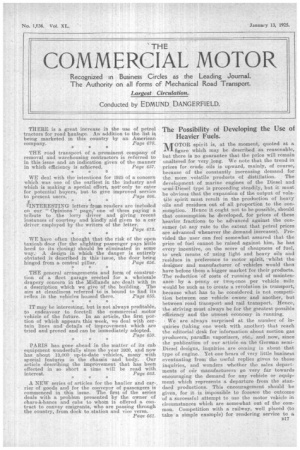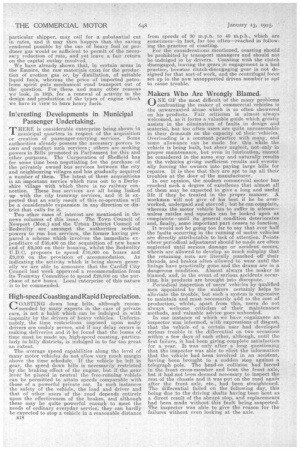The Possibility of Developing the Use of Heavier Fuels.
Page 1

Page 2

If you've noticed an error in this article please click here to report it so we can fix it.
MOTOR spirit is, at the moment, quoted at a figure which may be described as reasonable, but there is no guarantee that the price will remain unaltered for very long. We note that the trend in prices for crude oils is upward, mainly, of course, because of the constantly increasing demand for the more volatile products of distillation. The development of marine engines of the Diesel and .semi-Diesel type is proceeding steadily, but it must be obvious that the expansion of the output of volatile spirit must result in the production of heavy oils and residues out of all proportion to the consumption. Hence it ought not to be possible, should that consumption be developed, for prices of these heavier fractions to be advanced against the consumer (at any rate to the extent that petrol prices are advanced whenever the demand increases). Provided the user can feel somewhat assured that the price of fuel cannot be raised against him, he has every incentive, on the score of cheapness of fuel, to seek means of using light and heavy oils and residues in preference to motor spirit, whilst the designer and manufacturer of vehicles would then have before them a bigger market for their products. The reduction of costs of running and of maintenance by a penny or twopence per vehicle mile would be such as to create a revolution in transport, because what has to be considered is not ,competition between one vehicle owner and another, but between road transport and rail transport. Hence, the striving must always be for the greatest possible efficiency and the utmost economy in running.
We are always surprised at the number of inquiries (taking one week with another) that reach the editorial desk for information about suction gas producers, paraffin vaporizers, etc., and now, since the publication of our article on the German semiDiesel designs, inquiries are coming in about that type of engine. Yet one hears of very little business eventuating from the useful replies given to those inquiries, and wonders whether the sales departments of our manufacturers go very far towards encouraging the demand for any vehicle or equipment which represents a departure from the standard productions. This encouragement should be given, for it is impossible to foresee the outcome of a successful attempt to use the motor vehicle in circumstances which are somewhat out of the common. Competition with a railway, well placed (to take a simple example) for rendering service to a particular shipper, may call for a substantial cut in rates, and it may then happen that the saving rendered possible by the use of heavy fuel or producer gas would De sufficient to permit of the necessary reduction of rate, and yet leave a fair return on the capital outlay involved. We have already shown that, in certain areas in the Fmpire, the raw materials exist for the production of suction gas or, by-distillation, of suitable liquid fuels, whereas the price of imported petroleum spirit puts mechanical road transport out of the question. For these and many other reasons we look, in n25, for a renewal of activity in the design and production of the types of engine which we have in view to burn heavy fuels.
Interesting Developments in Passenger Undertaking. Municipal THERE is considerable enterprise being shown in municipal quarters in respect of the acquisition or creation of passenger-carrying services. Some authorities already possess the necessary powers to . own and conduct such services ; others are seeking powers in Billspromoted in Parliament for this and other purposes. The Corporation of Sheffield has for some time been negotiating for the purchase of the privately owned bus services between the city and neighbouring villages and has gradually acquired a number of them. The latest of these acquisitions is an important service which runs out to a Derbyshire village with which there is no railway connection. These bus services are all being linked up with the city tramway services, and it is expected that an early result of this co-operation will be a considerable expansion in any direction or district that calls for it: Two other cases of interest are mentioned in the news columns of this issue. The Town Council of Newport (Mon.) and the Urban District Council of Bedwellty are amongst the authorities seeking powers to run bus services, the former having prepared a scheme which involves the immediate expenditure of £35,400 on the acquisition of new buses and of £9,500. on their housing, whilst the Bedwellty U.D.C. proposes to spend X10,000 on buses and £3,000 on the provision of.. accommodation. As indicating the activity which is being shown generally we are able to announce that the Cardiff City Council Iasi week approved a recommendation from its Tramway Committee to spend £20,000 on the purchase of new buses. Local enterprise of this nature is to be commended.
Highspeed Coasting and Rapid Depredation.
COASTING down long hills, although recommended by many experts in the case of private cars, is not a habit which can be indulged in with impunity by the drivers of heavy vehicles. Unfortunately, the time restrictions imposed upon =fly drivers are unduly severe, and if any delay occurs in making deliveries and it be found that the losses of time must be made up, high-speed coasting, particularly in hilly districts, is indulged in to far too great an extent. The average speed capabilities along the level of many motor vehicles do not allow very much margin above the time schedule. If the vehicle be left in gear, the speed down hills is necessarily restricted by the braking effect of the engine, but if the gear lever be placed in neutral the free-running vehicle can be permitted to attain speeds comparable with those of a powerful private car. In such instances the safety of the vehicle, the load and driver and that of other users of the road depends entirely upon the effectivenem of the brakes, and although these may be quite powerful enough to meet the needs of ordinary everyday service, they can hardly be expected to stop a vehicle in a reasonable distance el8 from speeds of 30 m.p.h. to 40 m.p.h., which are sometimes—in fact, far too often—reached in following the practice of coasting. Eor the considerations mentioned, coasting should be prohibited by transport managers and should not be indulged in by drivers. Coasting with the clutch disengaged, leaving the gears in engagement is a bad practice, because clutch-disengaging gear is not designed for that sort of work, and the centrifugal force set up in the now unsupported driven member is apt to cause trouble.
Makers Who Are Wrongly Blamed. ()NE OF the most difficult of the many problems confronting the maker of commercial vehicles is the unwarranted abuse which is so often showered on his products. Fair criticism is almost always welcomed, as it forms a. valuable guide which greatly assists in the elimination of faults in design and material, but too often users are quite unreasonable in their demands on the capacity of their vehicles. Overloading is a constant practice with many, and some allowance can .be made for this while the vehicle is being built, but sheer neglect, not only in proper maintenance, but even in lubrication, cannot be considered in the same way and naturally results in the vehicles giving inefficient results and eventually forcing the owners into paying large bills for repairs, it is then that they are apt to lay all their troubles at the door of the manufacturer. In our opinion, the modern commercial motor has reached such, a degree of excellence that almost all of them may be expected to give a long and useful life if they be treated in the proper. manner. A workman will not give of his best if he be overworked, underpaid and starved; but he can complain, whereas the motor vehicle has to suffer in silence— unless rattles and squeaks can be looked upon as complaints—until its general condition deteriorates and, finally, some important part ceases to function. It would not be going too far to say that over half the faults occurring in the running of motor vehicles are directly attributable to lack of attention. Points where periodical adjustment should be made are often neglected Until serious damage or accident occurs, wheels are allowed to develop so much sideplay that the retaining .nuts are literally punched off their threads, and brakes often allowed to wear until the linings have practically gone and the drums are in a dangerous condition. Almost always the maker is blamed, and, in the event of serious accidents occurring, his products are brought into disrepute. Periodical inspection of users' vehicles by qualified men appointed by the makers certainly helps to alleviate the trouble, but such a system is expensive to maintain and must necessarily add to the cost of production, whilst, apart from this, users do not always welcome criticism of their maintenance methods, and valuable advice goes unheeded. In one instance of which we have cognizance an inspector was informed, with expressions of disgust, that the vehicle of a certain user had developed serious trouble in the differential on two occasions within a few days of each other, although, until the first failure, it had been giving complete satisfaction for a year. It was only after a long questioning that the inspector was able to elicit the information that the vehicle had been involved in an accident, having been brought to a sudden• stop against a telegraph pole. The head-on collision had forced in the front cross-member and bent the front axle, but it had not been deemed necessary to inspect the rest of the chassis and it was put on the road again after the front axle, etc., had been straightened. The differential failed on the following day, this being due to the driving shafts having been bent as a direct result of the abrupt stop, and replacements had been made without this fault being suspected. The inspector was able to give the reason for the failures without even looking at the axle.




























